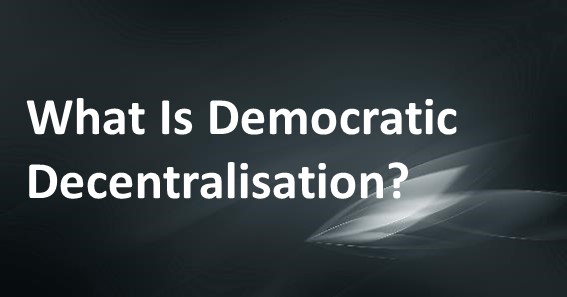Are you curious to know what is democratic decentralisation? You have come to the right place as I am going to tell you everything about democratic decentralisation in a very simple explanation. Without further discussion let’s begin to know what is democratic decentralisation?
What Is Democratic Decentralisation?
In an era where centralized power structures have traditionally dominated governance systems, the concept of democratic decentralisation has gained significant attention. Democratic decentralisation refers to the transfer of political, administrative, and financial authority from central governments to local communities. This approach aims to empower citizens, enhance participatory democracy, and promote efficient and accountable governance. In this blog post, we will explore the essence of democratic decentralisation, its benefits, and its potential challenges.
The Essence Of Democratic Decentralisation
Democratic decentralisation places decision-making power in the hands of local communities, giving them the autonomy to manage their affairs. It acknowledges that governance is not a one-size-fits-all approach and recognizes the unique needs and aspirations of different regions, cities, and rural areas. By involving citizens in decision-making processes, it promotes active civic engagement, fosters a sense of ownership, and strengthens the democratic fabric of society.
Key Features And Benefits
- Enhanced Local Governance: Democratic decentralisation enables local governments to respond more effectively to the specific needs and priorities of their communities. Local representatives, who are more familiar with local dynamics, can make informed decisions and implement policies that align with the aspirations of the people they serve. This proximity between the government and the governed fosters greater accountability and ensures that public resources are utilized efficiently.
- Increased Citizen Participation: By decentralizing power, democratic decentralisation encourages citizens to actively participate in local decision-making processes. It creates opportunities for individuals and communities to voice their concerns, contribute ideas, and engage in the formulation and implementation of policies. This inclusive approach promotes a sense of ownership and strengthens social cohesion.
- Tailored Development: Local communities often possess unique cultural, economic, and environmental characteristics that require specific development strategies. Democratic decentralisation enables local governments to design and implement development plans that are tailored to their region’s needs. This localized approach can lead to more sustainable and equitable development, as decisions are made in alignment with local realities.
- Efficient Service Delivery: Decentralisation allows for the efficient delivery of public services. Local governments are better positioned to understand and address the immediate needs of their communities, resulting in improved service quality and responsiveness. Additionally, decentralisation can foster innovation and creativity at the local level, leading to the development of locally relevant solutions and practices.
Challenges And Considerations
While democratic decentralisation offers numerous benefits, it also presents certain challenges that need to be addressed:
- Capacity Building: Effective decentralisation requires building the capacity of local governments and empowering them with the necessary resources, skills, and expertise. Adequate training programs and technical assistance must be provided to ensure that local representatives are equipped to make informed decisions and effectively manage local affairs.
- Fiscal Autonomy: Financial resources are crucial for local governments to implement policies and deliver services effectively. Therefore, establishing a mechanism for fiscal autonomy is essential, enabling local communities to generate revenue, manage budgets, and allocate resources based on local priorities.
- Power Imbalances: Decentralisation can be hindered by existing power imbalances between central and local governments. Ensuring a fair distribution of power and resources is crucial to prevent the concentration of authority and to promote the effective functioning of local governments.
- Coordination and Collaboration: While local autonomy is important, effective coordination and collaboration between different levels of government are essential. Clear mechanisms for intergovernmental cooperation and coordination should be established to ensure harmonious functioning and prevent duplication of efforts.
Conclusion
Democratic decentralisation represents a shift toward more participatory and accountable governance systems. By empowering local communities, it enhances citizen participation, tailors development strategies, and improves service delivery. However, challenges such as capacity building, fiscal autonomy, power imbalances, and coordination need to be addressed for successful implementation. Embracing democratic decentralisation has the potential to foster stronger democracies, build resilient communities, and create inclusive and sustainable societies.
FAQ
What Is Decentralisation In Short Answer?
Definition of Decentralisation
Decentralisation is referred to as a form of an organisational structure where there is the delegation of authority by the top management to the middle and lower levels of management in an organisation.
What Is Decentralization Class 10?
When power is taken away from Central and State governments and given to local government, it is called decentralisation.
What Are The Advantages Of Democratic Decentralization?
(i) Conflict is reduced when the power is shared between the center and states and local government. (ii) a large number of problems and issues can be best settled at the local level. (iii) People have better knowledge of their own problems in their localities.
Who Was The Father Of Decentralisation?
Mahatma Gandhi advocated panchayat raj as the foundation of India’s political system. It would have been a decentralised form of government, where each village would be responsible for its own affairs. The term for such a vision was Gram Swaraj (“village self-governance”).
I Have Covered All The Following Queries And Topics In The Above Article
What Is Democratic Decentralisation In India
What Is Democratic Decentralisation Upsc
Democratic Decentralisation Meaning In Hindi
Importance Of Democratic Decentralisation
Democratic Decentralisation In India Pdf
Democratic Decentralisation Essay Pdf
Democratic Decentralisation Was Suggested By Whom
Types Of Democratic Decentralisation
What Is Democratic Decentralisation
What are the advantages of democratic decentralisation
What is democratic decentralization?


